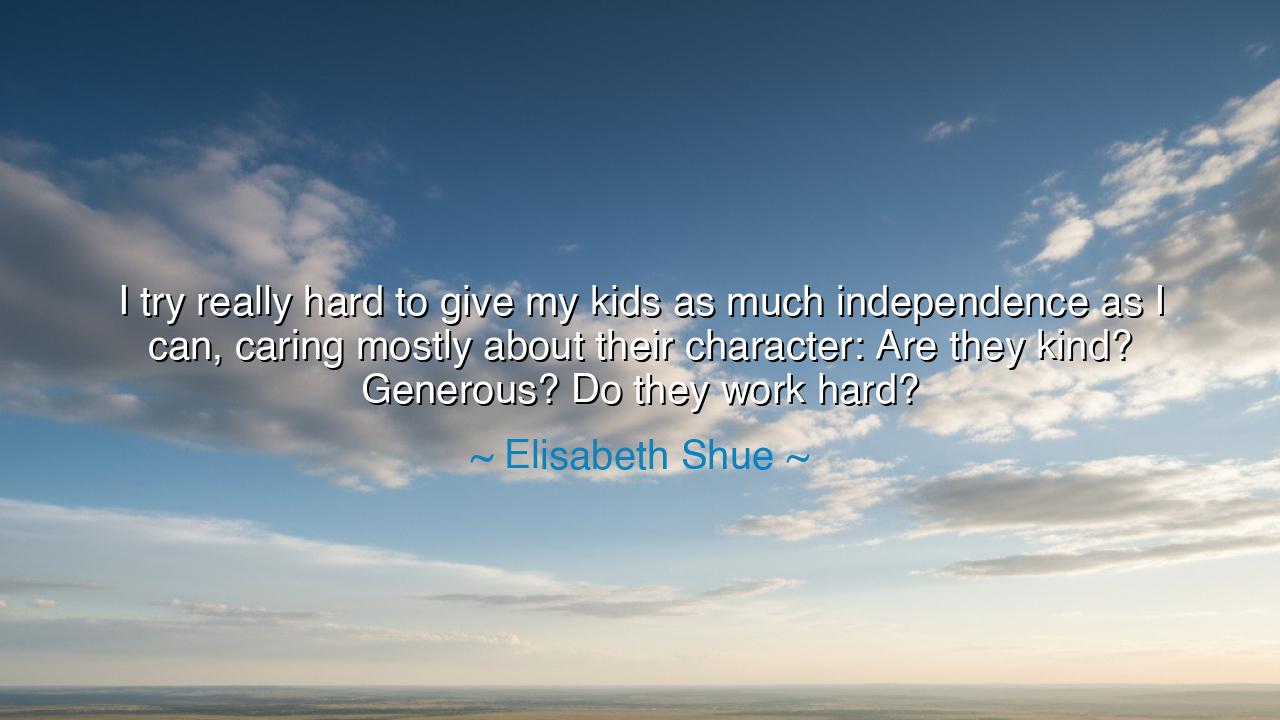
I try really hard to give my kids as much independence as I can
I try really hard to give my kids as much independence as I can, caring mostly about their character: Are they kind? Generous? Do they work hard?






Listen, O children of the future, for the words of Elisabeth Shue carry the wisdom of a mother who understands the true meaning of independence. She says, "I try really hard to give my kids as much independence as I can, caring mostly about their character: Are they kind? Generous? Do they work hard?" These words are not simply about parenting, but about the deeper wisdom that has guided generations before us—the belief that true independence is not just the freedom to make choices, but the strength of character that guides those choices. It is in the nurturing of one's inner qualities that independence becomes a beacon for a life well-lived.
In the ancient world, the strength of one's character was paramount to achieving true freedom. The Greeks, who founded the great tradition of philosophy, believed that the cultivation of virtues such as wisdom, courage, temperance, and justice was essential to a well-ordered life. Socrates, the great philosopher, taught his students that a life without reflection and virtue was a life unworthy of freedom. For Socrates, true independence came not from the freedom to do as one pleases, but from the ability to act in accordance with reason and moral integrity. Similarly, Elisabeth Shue emphasizes that true independence is not merely about personal freedom, but about the strength of character that shapes the actions one takes in that freedom.
The ancient Romans, too, understood that character was the foundation of a free and just society. Cicero, a statesman and philosopher, believed that virtue was the very heart of political and personal freedom. He spoke of the importance of self-discipline, courage, and honor—qualities that formed the backbone of a society in which individuals could stand tall and unshackled. In the same way, Elisabeth Shue speaks to the importance of shaping her children’s character—of ensuring that their independence is guided by values that make them good, honest, and hardworking individuals. A true independent person, in her view, is not one who acts selfishly or without regard for others, but one who possesses a generous, kind, and diligent spirit.
The great Confucius of ancient China also emphasized the importance of character in his teachings. He believed that a well-ordered society was built upon individuals who cultivated personal virtues. To Confucius, the practice of filial piety, respect for elders, and the cultivation of good character were fundamental to a flourishing life. His philosophy was not only about personal freedom, but about the interdependence that exists in a society where individuals live with virtue and work together for the common good. Similarly, Shue’s focus on the character of her children reflects this ancient wisdom—the belief that true independence comes not from acting without responsibility, but from having the internal strength to make choices that are wise, generous, and kind.
Let us look to the example of Mahatma Gandhi, who, though a man of profound personal independence, lived a life grounded in character. Gandhi’s commitment to truth, non-violence, and self-discipline shaped the Indian independence movement and earned him the respect of the world. His life was a reflection of the very principles Shue speaks of—his independence was not simply political, but deeply spiritual. He believed that freedom could only be meaningful if it was accompanied by a deep commitment to virtue. Like Gandhi, Elisabeth Shue teaches that independence is not just about self-reliance, but about the inner strength that allows one to live according to the highest moral principles.
The lesson from Shue’s words is clear: independence is a journey that begins not with external freedom, but with the cultivation of inner strength and character. Independence is not just about making choices freely, but about making choices that reflect the deepest values of kindness, generosity, and hard work. True freedom comes from knowing who you are and what you stand for, and acting with integrity and responsibility. The strongest and most lasting form of independence is one that is rooted in personal character—one that holds the individual accountable not only to themselves but to the world around them.
Take this wisdom into your own lives, O children: as you seek to live with independence, let it be guided by your character. In all things, ask yourself: Are you living with kindness? Are you generous in spirit and deed? Do you work with honor and diligence, not for personal gain, but for the good of the community? Independence is not a privilege to be abused, but a responsibility to be carried with honor and respect. May you grow strong not only in your ability to make choices, but in your capacity to choose wisely, choose virtuously, and choose with an open heart. This, O children, is the true independence that will guide you toward a life of freedom and fulfillment.






AAdministratorAdministrator
Welcome, honored guests. Please leave a comment, we will respond soon